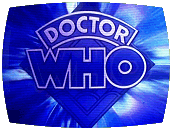 Two spacecraft collide in hyperspace, one of them a passenger liner loaded with vacationers. The Doctor and Romana witness it all but, as they try to lend aid, they discover that something more sinister is happening: the captain of the passenger ship was, at the time of the accident, high on a potent and addictive narcotic called vraxoin. When the proper authorities arrive to investigate, they naturally point the finger of blame at the two most recent arrivals – the Doctor, Romana and K-9. But what the Doctor finds out is more disturbing than a mere drug ring. Vraxoin itself is created only from the residue left by the death of humanoid creatures called Mandrels – and someone is transporting live Mandrels undetected, intending to kill them to create more of the drug.
Two spacecraft collide in hyperspace, one of them a passenger liner loaded with vacationers. The Doctor and Romana witness it all but, as they try to lend aid, they discover that something more sinister is happening: the captain of the passenger ship was, at the time of the accident, high on a potent and addictive narcotic called vraxoin. When the proper authorities arrive to investigate, they naturally point the finger of blame at the two most recent arrivals – the Doctor, Romana and K-9. But what the Doctor finds out is more disturbing than a mere drug ring. Vraxoin itself is created only from the residue left by the death of humanoid creatures called Mandrels – and someone is transporting live Mandrels undetected, intending to kill them to create more of the drug.
written by Bob Baker
directed by Alan Bromly
music by Dudley SimpsonGuest Cast: David Daker (Rigg), Lewis Fiander (Tryst), Jennifer Lonsdale (Della), Geoffrey Bateman (Dymond), Barry Andrews (Stott), Stephen Jenn (Secker), Geoffrey Hinsliff (Fisk), Peter Craze (Costa), Pamela Ruddock (Computer voice), Richard Barnes, Sebastian Stride, Eden Phillips (Crewmen), Annette Peters, Lionel Sansby, Peter Roberts, Maggie Petersen (Passengers), Billy Gray (Wounded passenger), James Muir, Derek Suthern, David Korff, Jan Murzynowski, Robert Goodman (Mandrels)
Broadcast from November 24 through December 15, 1979
LogBook entry & review by Earl Green
Review: At the time Nightmare Of Eden was first broadcast on the BBC, it was hailed as a Doctor Who object lesson about the dangers of smuggling, selling or using illegal drugs. With the benefit of almost 25 years’ hindsight, it is now possible to see more clearly and wonder what those friendly critics were smoking, for Eden has all the anti-drug-message power of Nancy Reagan’s celebrity guest shot on Diff’rent Strokes. Perhaps even less.
For starters, Eden is from the latter half of the Graham Williams / Douglas Adams era, which means it’s incredibly jokey and tongue-in-cheek. Not a good tone to take for an anti-drug message. Whatever message there is goes AWOL pretty quickly as the comedic excesses of the era – including Lewis Fiander’s dreadfully affected accent (I almost typed “accident” there, and you know, maybe that’s closer to the mark). One of Tom Baker’s all-time funniest gags happens here, as he walks into a virtual jungle, vanishes, and then is hear yelling “Oh, my arms! My legs! My everything!” as tattered bits of his clothing are ejected from the jungle while a horrified Romana watches. Funny as hell, but again, undermining what was supposedly an attempt at tackling a serious topic.
Not Doctor Who’s finest hour by a long shot, and certainly not a milestone in getting an important message across to a young and impressionable audience. I would’ve been more satisfied with this story had it only concerned itself with, oh, say, two spaceships colliding in hyperspace. If someone tries to convince you that this is a Doctor Who story with a message…just say no.

